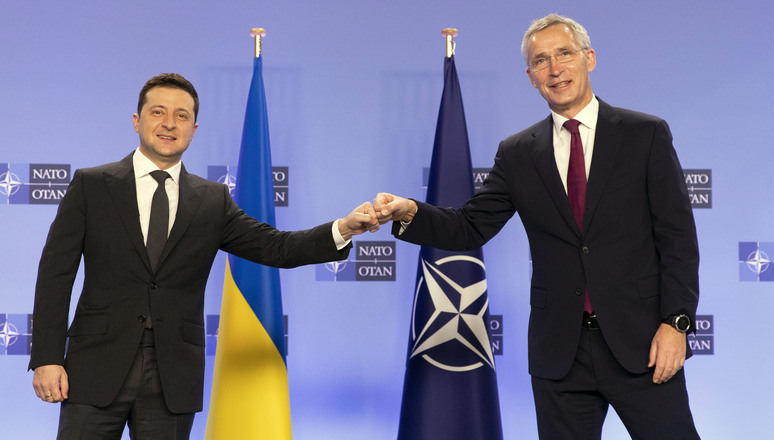by Emanuel Pietrobon and Juan Martin G.Cabañas
Ukraine is a battlefield and also a negotiating table. An area of dispute of the „Clash of Civilizations“ predicted by Samuel Huntington in the near but distant 1996. Ukraine is where it all ends and starts. It’s where Eurasianism ends (the dream of a Europe from Lisbon to Vladivostok) and is where the new chapter of the perpetuum bellum begins between the extremes of the West: North America and Russia. And it is, above all, a key theatre of operations of the „Third World War in pieces“.
In Ukraine a new chapter is being fought of what Pope Francis had already called „Third World War in pieces“ in 2014. History proved that the present Summum Pontifex was right: those conflicts that exploded like wildfire across the planet were part of a wider hegemonic confrontation between blocs. Geopolitical blocks that in 2022, after eight years of germination alternating with latency phases, began their tectonic shocks.
Analysts fear the „internationalization of the conflict,“ but the truth is that it is already global. In a way, it has always been. But it officially became global when Ukraine created a Foreign Legion, began to receive weaponry from NATO, and when Russia assembled its own platoons of loyalists, with its own debts with Kiev.
From the Peripheries to the Core: some scenarios
The Third World War in pieces, or „Great Powers competition“, entered a new stage in which there is an increase in the presence of the conflict „from the Peripheries to the Cores„.
The peripheries, that is, the marginalized, the laggards of globalization, the satellites, the disputed land fringes, the States on the margins of the great empires, the remnants of colonial times. The peripheral States had been the ones overwhelmed in the recent years by civil wars, coups and hybrid operations in the pre-war period in Ukraine. Kazakhstan was the latest example recently. And it is the peripheral states that will experience a crescendo of instability in a hypothetical post-war period (or temporary truce).
For example, the Atlantic is a “suburb” with lots of powder kegs to explode, is the scenario where the Moscow-Beijing axis would try to move its pieces with bold, but predictable, reactions to the Western advance (AUKUS in the Indo-Pacific and NATO in Eastern Europe) into the respective „neighbourhoods“ of Russia and China. The logic of these „Revisionist Powers“ will be very clear: if they do not have the right to have their own Areas of Influence, nor the United States should have the “right”. The „Monroe doctrine“ in the XXI century might be put to the test.
To be short, the Atlantic could become as geo-relevant as the Indo-Pacific is today. This is suggested by some events that happened in 2021: the renewed Russian support for Latin American political forces with critical stances to Washington; the official arrival of China in Nicaragua; the wave of instability that affected the French dominions in Latin America; and last but not least, the striking Chinese endorsement of Argentina’s claim to sovereignty over the Malvinas-Falklands Islands.
A different world
The „total economic war“ against Russia is the symbol of the new globalization that is emerging: a “Globalization in Compartments“ of several rails, and at several speeds, with compartments of micro and macro regional nature. A process led by the Trump administration, which has been speeded up by the COVID-19 pandemic and the recent war in Ukraine.
In the new model of globalization that is emerging, regional integrative processes such as the European Union (EU) and the Eurasian Economic Union (EEU) are articulated but at the same time they are decoupling (in a kind of competition among continental projects).
A globalization and regionalization with a more progressive de-dollarization would be another example… this implies that Europe and Asia could be two increasingly separate blocs…
In this hypothetical „Globalization in Compartments“, after the recent events in Ukraine there’s the possibility that Russia –de facto– will become a part of the Asian bloc (perhaps the dream of Eurasianism, the dream of a Europe extended from Lisbon to Vladivostok, died on 24 February 2022, or at least it will not be possible to restore for a long time).
Changing geopolitical realignments
As globalization is changing, so is the formation of blocs, poles and alliances at the international stage. There’s a risk that the times of moderation and passive neutrality may be closer to the end. Even Switzerland, absent from the two world wars, has broken a centuries-old tradition of neutrality by condemning Russian action in Ukraine.
We live in troubled times, of geopolitical realignments through the choice of sides, surely the Great Powers will ask for tests of loyalty to the peripheral countries. Some will respond firmly, while others „will change their team’s jersey“ unexpectedly. Only a few days ago, the Biden administration initiated an attempt to approach Maduro’s Venezuela, which was vilified years ago by the North-Americans. Tomorrow there can be several cases of other „rivals“ to seduce. Tomorrow everything is possible: the Great Powers, the Core zones are few, the Peripheries are numerous.
One thing is certain: the war in Ukraine has changed many things; the cards on the table have been scrambled.
By appealing the Russian leadership to direct military intervention in the dispute, they have crossed the Rubicon and have dragged the world, conscious of it or not, into unexplored scenarios whose nature, like the Owl of Minerva, will only be better understood with the passage of time.
1. April 2022.

